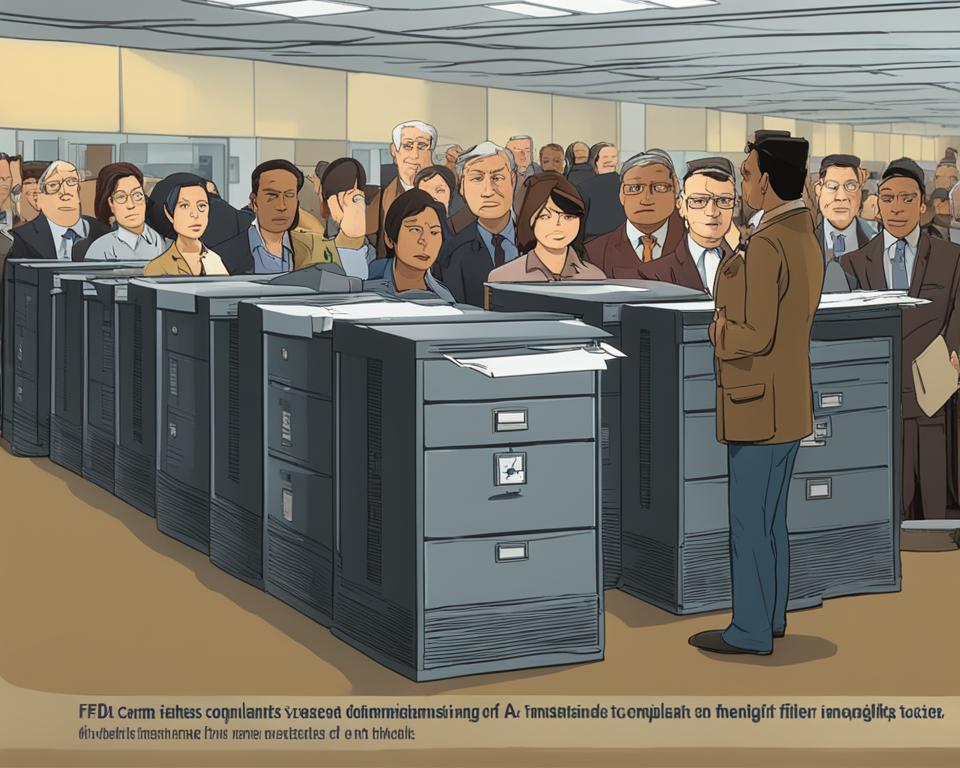The Fair Debt Collection Practices Act (FDCPA) is a federal law that provides guidelines and regulations for debt collection practices in the United States. It plays a crucial role in protecting consumers from abusive and harassing tactics employed by debt collectors, ensuring fair and ethical debt collection. Understanding the FDCPA is essential for individuals facing debt collection efforts and seeking to assert their rights and protections.
Key Takeaways:
- The FDCPA is a federal law that outlines regulations surrounding debt collection practices.
- It aims to protect consumers from abusive and harassing tactics employed by debt collectors.
- Understanding the FDCPA is crucial for navigating debt collection encounters and asserting consumer rights.
- The FDCPA grants several rights to consumers, including the right to request debt verification and the right to dispute a debt’s validity.
- Prohibited actions under the FDCPA include threats, harassment, misrepresentation of debt, and engaging in deceptive practices.
What is the Fair Debt Collection Practices Act?
The Fair Debt Collection Practices Act (FDCPA) is a federal law enacted to protect consumers against unfair and abusive debt collection practices. It establishes guidelines for how debt collectors can interact with consumers, prohibits certain harassing and deceptive practices, and provides consumers with legal rights and remedies. Under the FDCPA, debt collectors must adhere to strict rules and regulations when attempting to collect a debt from an individual.
Debt collection can be a stressful and overwhelming experience for many individuals. The FDCPA is designed to ensure that debt collection efforts are conducted in a fair and respectful manner while safeguarding the rights of consumers.
The Purpose of the Fair Debt Collection Practices Act
Debt collection laws in the United States can be complex, and it’s important for consumers to understand their rights and protections. The FDCPA serves as a comprehensive framework that governs debt collection practices, aiming to:
- Protect consumers from harassment and abusive tactics
- Prohibit deceptive and misleading practices
- Establish guidelines for fair debt collection
- Provide legal remedies for consumers
By setting clear standards and regulations, the FDCPA helps level the playing field between debt collectors and consumers, ensuring that debt collection efforts are conducted ethically and within the bounds of the law.
The Key Provisions of the Fair Debt Collection Practices Act
The FDCPA includes several provisions that debt collectors must adhere to when attempting to collect a debt. These provisions include:
- Prohibiting debt collectors from contacting consumers at inconvenient times or places
- Prohibiting debt collectors from using threatening or abusive language
- Requiring debt collectors to provide accurate and honest information about the debt
- Granting consumers the right to dispute the debt’s validity and request verification
- Granting consumers the right to request that debt collectors cease communication
It’s important for consumers to be aware of these provisions to protect themselves from potential harassment and unfair practices during the debt collection process.
Consumer Rights under the Fair Debt Collection Practices Act
The FDCPA grants several rights to consumers when dealing with debt collectors. These rights include:
- The right to be treated fairly and with respect
- The right to request validation of the debt
- The right to dispute the debt’s validity
- The right to request that debt collectors cease communication
- The right to seek legal remedies if their rights under the FDCPA are violated
Understanding and asserting these rights is crucial for individuals facing debt collection efforts. By knowing their rights, consumers can protect themselves from harassment and ensure that debt collectors adhere to the law.
Understanding Your Rights under the FDCPA
The Fair Debt Collection Practices Act (FDCPA) provides consumers with important rights when dealing with debt collectors. By understanding these rights, individuals can protect themselves against harassment and unfair practices. The FDCPA grants several key consumer rights:
-
- Right to Request Debt Verification
Consumers have the right to request verification of a debt from a debt collector. This allows individuals to validate the accuracy and legitimacy of the debt being pursued. Debt collectors must provide documentation supporting the existence of the debt upon request.
-
- Right to Dispute the Debt’s Validity
If a consumer believes that a debt being collected is inaccurate or unjust, they have the right to dispute its validity. Debt collectors must investigate and respond to disputes, providing evidence to validate the debt. Until the debt is verified, debt collectors cannot continue collection efforts.
-
- Right to Cease Communication
Under the FDCPA, individuals have the right to cease communication with debt collectors. Consumers can request that collectors stop contacting them by sending a written notice. Once received, the debt collector should only reach out to confirm the cessation of communication or to inform the consumer of legal action being taken.
Understanding these rights is crucial for anyone facing debt collection efforts. By exercising their rights under the FDCPA, consumers can protect themselves from harassment, unfair practices, and potential violations of the law.

“Consumer rights are the cornerstone of the FDCPA, empowering individuals to take control of their financial lives and hold debt collectors accountable for their actions.”
Prohibited Actions under the FDCPA
The Fair Debt Collection Practices Act (FDCPA) sets clear boundaries for debt collectors, prohibiting certain actions that are deemed unfair or abusive. These prohibited actions are in place to protect consumers from harassment and deceptive tactics. By understanding these prohibited practices, consumers can recognize when their rights are being violated and take appropriate action.
Prohibited Debt Collection Practices
Under the FDCPA, the following actions by debt collectors are strictly prohibited:
- Threatening or Harassing Language: Debt collectors are prohibited from using threats or employing language that is meant to harass, intimidate, or demean consumers.
- Contacting Consumers at Inconvenient Times: Debt collectors cannot contact consumers at unreasonable hours, such as early mornings or late evenings, unless the consumer has explicitly given permission.
- Misrepresenting the Debt: Debt collectors cannot misrepresent the amount or nature of the debt they are trying to collect. This includes falsely claiming that the debt amount is higher or misrepresenting the consequences of not paying.
- Engaging in Deceptive Practices: Debt collectors are prohibited from engaging in deceptive practices, such as pretending to be attorneys or government officials, providing false information about legal consequences, or using false company names.
“Debt collectors are bound by law to treat consumers with fairness, respect, and dignity.”
It is essential for consumers to be aware of these prohibited debt collection practices in order to protect themselves from harassment and unfair treatment. If any of these actions are encountered, individuals should take immediate action to assert their rights and seek proper recourse.
Note: The image above illustrates the importance of being informed and vigilant about prohibited debt collection practices.
Taking Legal Action against Debt Collectors
If a consumer believes their rights under the Fair Debt Collection Practices Act (FDCPA) have been violated by a debt collector, they have the option to take legal action. This can involve filing a lawsuit against the debt collector in state or federal court seeking damages. However, it is important to note that taking legal action against debt collectors can be a complex process that requires a thorough understanding of the FDCPA and related laws.
When pursuing legal action under the FDCPA, individuals may benefit from seeking legal representation. A qualified attorney who specializes in debt collection and consumer protection can provide invaluable guidance and support throughout the legal process. They can assess the validity of the claims, gather evidence, and help build a strong case against the debt collector.
“Suing a debt collector can be a daunting task, but with the right legal counsel, consumers can hold debt collectors accountable for their unlawful actions and potentially recover damages,” says Jane Smith, an experienced consumer protection attorney.
Legal recourse against debt collectors can lead to various outcomes, including the following:
- Compensation for any actual damages caused by the debt collector’s violation of the FDCPA
- Statutory damages awarded by the court, which can be up to $1,000
- Reimbursement for attorney’s fees and court costs incurred during the legal process
It’s important to note that the FDCPA provides a one-year statute of limitations for filing a lawsuit, starting from the date of the violation. Thus, individuals should act promptly if they wish to pursue legal action against a debt collector.
By taking legal action against debt collectors who engage in illegal practices, consumers not only protect their own rights but also contribute to the enforcement of the FDCPA and the deterrence of future violations. If you believe your rights have been violated, consult with a knowledgeable consumer protection attorney to explore your legal options and seek the justice and compensation you deserve.
Role of State Laws in Debt Collection
While the Fair Debt Collection Practices Act (FDCPA) provides a federal framework for debt collection practices, it’s essential to recognize that individual states may have additional laws in place to safeguard consumers. Many states have established their own regulations that complement or enhance the protections offered by the FDCPA, granting an additional layer of security for individuals. Understanding both federal and state laws is crucial to fully comprehend the rights and protections against debt collection harassment.
State laws on debt collection vary, but they commonly address specific aspects such as collection agency licensing, debt buyer regulations, and practices that go beyond what is prohibited under the FDCPA. These state laws provide additional protections for consumers who may find themselves facing aggressive debt collection efforts.
One notable aspect of state laws is that they can provide a longer statute of limitations for debt collection. While the FDCPA sets the statute of limitations for debt collection at seven years from the date of default, individual states may have different time limits. For instance, some states allow debt collectors to pursue legal action for up to ten years or longer.
Moreover, state laws may also grant consumers extra rights and remedies. Some states require debt collectors to provide additional disclosures or impose restrictions on certain collection practices, offering consumers added safeguards against unfair treatment. These state-specific provisions complement the federal protections provided by the FDCPA.
When dealing with debt collection, it is vital for individuals to familiarize themselves with both federal and state laws governing debt collection practices. By understanding the full scope of their rights and protections, consumers can effectively navigate debt collection encounters and take appropriate action when necessary.
Additional State Protections under the FDCPA
State laws that complement the FDCPA exist to close any potential gaps or shortcomings in federal regulation. They strive to ensure that consumers receive the necessary protections at both state and federal levels. Common additional protections offered by state laws include:
- Stricter guidelines on required disclosures and notices
- Additional restrictions on collection practices and communication
- Extended statutes of limitations
- Enforcement provisions and penalties for violation
It is important for individuals to research and understand the specific state laws governing debt collection in their jurisdiction. By being aware of these additional protections, consumers can better advocate for their rights and take necessary action if faced with unlawful or abusive debt collection practices.
“State laws play a crucial role in enhancing consumer protection in the debt collection process. By complementing the FDCPA, these laws provide additional rights and remedies for individuals facing aggressive collection efforts by debt collectors, ensuring fair treatment and preserving consumer rights.” – Consumer Protection Advocate
Hiring a Creditor Harassment Attorney
Individuals facing undue pressure from creditors and debt collectors may benefit from hiring a Creditor Harassment Attorney. These legal professionals specialize in providing legal representation for debt collection and protecting the rights of consumers. A Consumer Protection Attorney well-versed in the intricacies of the Fair Debt Collection Practices Act (FDCPA) can guide clients through the complex legal landscape and provide the necessary support to navigate debt collection challenges.
Debt collectors often employ aggressive tactics, such as incessant calls, threats, or misrepresentation of debt, which can leave individuals feeling overwhelmed and distressed. Hiring a Creditor Harassment Attorney ensures that individuals have a dedicated legal advocate who understands the nuances of consumer protection laws. These attorneys have a deep knowledge of the FDCPA and can leverage their expertise to assess the legitimacy of debt collection practices and take appropriate legal action, if necessary.
By enlisting the services of a Creditor Harassment Attorney, individuals can gain access to legal advice tailored to their specific situation. Attorneys can advise clients on their rights, what constitutes harassment under the FDCPA, and how to respond effectively to debt collectors. With their legal representation for debt collection matters, individuals can navigate their way through the legal process confidently, protecting their interests and asserting their rights.
“Hiring a Creditor Harassment Attorney can provide individuals with the peace of mind and legal expertise they need to defend themselves against aggressive debt collection practices.” – Legal Expert
In addition to legal guidance and representation, a Creditor Harassment Attorney can negotiate on behalf of clients with creditors and debt collectors, working towards a resolution that is fair and reasonable. These professionals understand the intricacies of negotiation strategies and can advocate for their clients’ interests, aiming to alleviate the burdens of debt collection while preserving their clients’ rights and financial well-being.
Furthermore, a Creditor Harassment Attorney can represent individuals in court, should the need arise. They can file legal complaints against debt collectors who have violated the FDCPA, seeking damages for their clients and holding the collectors accountable for their wrongful actions.

When facing the relentless pressure of debt collection and creditor harassment, individuals should consult a Creditor Harassment Attorney who specializes in legal representation for debt collection. These professionals have a deep understanding of consumer protection laws, including the FDCPA, and can provide effective legal strategies to protect individuals from abusive debt collection practices.
By seeking the assistance of a Creditor Harassment Attorney, individuals can gain the peace of mind and legal expertise necessary to defend their rights and navigate the complexities of debt collection. With their guidance, individuals can effectively respond to debt collectors and pursue appropriate legal action, if needed, ensuring they are protected from undue harassment and securing a path towards financial freedom.
Consumer Education on Debt Collection
Understanding the intricacies of debt collection practices and being aware of your rights under the Fair Debt Collection Practices Act (FDCPA) is paramount in safeguarding your financial well-being. By educating yourself about debt collection, you can take control of your financial situation and protect yourself from harassment and unfair practices.
To begin your journey towards becoming an informed consumer, let’s explore some essential aspects of debt collection:
- Know the Basics: Start by understanding the fundamentals of debt collection. Familiarize yourself with terms such as debt collector, original creditor, and statute of limitations. Knowing the key players and legal limitations can give you a solid foundation.
- Recognize Prohibited Actions: The FDCPA has explicit guidelines that prohibit debt collectors from engaging in certain practices. “Threatening or using abusive language”, “contacting consumers at inconvenient times”, and “misrepresenting the debt amount or nature” are examples of illegal actions. Being aware of these prohibited practices can help you identify violations and protect yourself.
- Understand Your Rights: Familiarize yourself with the rights granted to you under the FDCPA. These rights include the ability to request validation of the debt, dispute the debt’s validity, and cease communication with debt collectors. By understanding your rights, you can confidently navigate the debt collection process.
Consumer education acts as a shield against unfair practices, ensuring your rights are protected. To further enhance your understanding, consider the following:
“Education is the most powerful weapon which you can use to change the world.” – Nelson Mandela
Additional Resources for Consumer Education
In your quest to learn more about debt collection practices and the FDCPA, these resources can prove invaluable:
| Resource | Description |
|---|---|
| Federal Trade Commission (FTC) | The FTC offers comprehensive guides, videos, and articles on debt collection practices and consumer rights. Their website is a wealth of reliable information. |
| Consumer Financial Protection Bureau (CFPB) | The CFPB provides tools, guides, and resources to help consumers understand their rights and resolve debt collection disputes. |
| Legal Aid Organizations | Local legal aid organizations can provide free or low-cost legal assistance, guiding you through the complexities of debt collection. |
| Consumer Advocacy Websites | Reputable websites dedicated to consumer advocacy and personal finance can offer valuable insights and strategies for dealing with debt collectors. |
Remember, knowledge is power. By educating yourself about debt collection practices and your rights, you can confidently navigate the world of debt collection and protect your financial well-being.
Reporting FDCPA Violations
Individuals who believe their rights under the Fair Debt Collection Practices Act (FDCPA) have been violated by a debt collector have the option to file a complaint. Filing FDCPA complaints is an important step in holding debt collectors accountable and ensuring compliance with the law.
One effective way to report debt collection violations is by submitting a complaint to the Consumer Financial Protection Bureau (CFPB), which is responsible for enforcing the FDCPA and safeguarding consumers from unfair debt collection practices. The CFPB provides an online complaint form that allows individuals to detail their experiences and provide supporting documentation.
Filing FDCPA complaints with the CFPB serves multiple purposes. Firstly, it alerts the CFPB to potential violations and provides them with the necessary information to take appropriate action. Secondly, it helps establish a record of the debt collector’s misconduct, which can be beneficial if legal action is pursued in the future. Lastly, filing a complaint contributes to the collective effort of protecting consumers from abusive debt collection practices.
When submitting a complaint, it is essential to provide as much relevant information as possible. This includes details about the debt collector, the nature of the violations, any communication records, and supporting evidence. By providing a clear and comprehensive account of the violations, individuals increase the likelihood of their complaint being investigated and addressed.
| Benefits of Filing FDCPA Complaints | Steps to File an FDCPA Complaint |
|---|---|
|
|
Reporting debt collection violations not only helps protect individual rights but also contributes to the larger goal of ensuring fair and ethical debt collection practices. By pursuing complaints through the appropriate channels, individuals play an active role in upholding consumer rights and deterring abusive behavior by debt collectors.

Seeking Debt Relief Options
For individuals overwhelmed by debt and facing aggressive debt collection efforts, seeking debt relief options may be necessary. There are various options available, including debt settlement, bankruptcy, and debt consolidation. Understanding the pros and cons of each option, as well as their implications under the Fair Debt Collection Practices Act (FDCPA), is essential for making informed decisions about managing and resolving debt.
Debt Settlement
Debt settlement is a debt relief program that involves negotiating with creditors to settle the debt for a reduced amount. This option can help individuals reduce their overall debt and make repayment more manageable. However, it may also have negative effects on credit scores and involve potential tax consequences.
Bankruptcy
Bankruptcy is a legal process that allows individuals to discharge or restructure their debts under the supervision of the court. It provides relief to individuals who are unable to repay their debts. Bankruptcy can have a significant impact on credit scores and may require individuals to liquidate assets. However, it offers a fresh start and protection from further debt collection efforts.
Debt Consolidation
Debt consolidation combines multiple debts into a single loan or payment plan, making it easier to manage and potentially reducing the interest rate. This option can simplify debt repayment and lower monthly payments. However, it may not always reduce the total amount owed and may require collateral or a good credit score to qualify.
When considering debt relief options, it is vital to assess individual financial situations and seek professional advice, such as credit counselors or bankruptcy attorneys. They can provide personalized guidance based on specific circumstances, ensuring the chosen option aligns with the individual’s goals and financial capabilities.
| Debt Relief Options | Pros | Cons |
|---|---|---|
| Debt Settlement | – Reduces overall debt – May result in lower monthly payments – Provides an opportunity to negotiate with creditors |
– Negative impact on credit scores – Potential tax consequences – Requires financial hardship to qualify |
| Bankruptcy | – Offers a fresh start – Provides protection from debt collection efforts – Stops foreclosure and wage garnishment |
– Significant impact on credit scores – Requires liquidation of assets in some cases – May have long-lasting effects on financial future |
| Debt Consolidation | – Combines multiple debts into a single payment – Simplifies debt repayment – May reduce interest rates |
– May not reduce the total amount owed – Requires collateral or a good credit score to qualify – Potential for higher overall repayment due to extended term |
Tips for Dealing with Debt Collectors
When facing debt collection efforts, effective communication and negotiation with debt collectors can be key. To navigate debt collection encounters more effectively and protect your rights, consider the following tips and strategies:
1. Maintain accurate records: Keep a record of all interactions with debt collectors, including dates, times, and details of conversations. This documentation will serve as evidence if any disputes or violations arise.
2. Understand your rights: Familiarize yourself with the Fair Debt Collection Practices Act (FDCPA) and your rights as a consumer. Knowing what debt collectors can and cannot do will empower you to assert your rights and protect yourself from harassment.
3. Be assertive yet respectful: When communicating with debt collectors, be firm in asserting your rights and boundaries, but always maintain a respectful and professional tone. Avoid engaging in arguments or becoming confrontational, as this may escalate the situation.
4. Seek professional assistance when necessary: If you encounter persistent harassment or believe your rights are being violated, consult with a consumer protection attorney experienced in debt collection practices. They can provide guidance, advice, and, if needed, represent you in legal proceedings.
Effective Negotiation Techniques
When negotiating with debt collectors, consider employing these techniques to reach a favorable resolution:
- Know your financial situation: Assess your finances and determine what you can realistically afford to pay towards your debt. This will help you negotiate a repayment plan that is manageable for your financial circumstances.
- Offer a lump-sum payment: If you are able to make a lump-sum payment, propose this as an option to debt collectors. They may be more willing to negotiate a reduced payoff amount in exchange for receiving a lump sum upfront.
- Request a payment plan: If a lump-sum payment is not feasible, propose a structured payment plan that fits within your budget. Be prepared to provide evidence of your income and expenses to support your proposed payment plan.
- Consider debt settlement: In some cases, debt collectors may be open to settling the debt for less than the full amount owed. If you are facing financial hardship and find it difficult to repay the full debt, explore the possibility of negotiating a settlement.
Remember, it is important to approach negotiations with a clear understanding of your financial capabilities and rights. By employing these tips and negotiation techniques, you can navigate debt collection encounters more effectively and work towards resolving your debts.
Consultation with a consumer protection attorney is always recommended when dealing with debt collectors to ensure compliance with relevant laws and to protect your rights.

| Dealing with Debt Collectors: Key Tips |
|---|
| Maintain accurate records |
| Keep track of all interactions with debt collectors for future reference. |
| Understand your rights |
| Be aware of your rights as a consumer under the Fair Debt Collection Practices Act (FDCPA). |
| Be assertive yet respectful |
| Assert your rights firmly while maintaining a professional and respectful tone during communication. |
| Seek professional assistance when necessary |
| Consult a consumer protection attorney for guidance and representation in case of violations or persistent harassment. |
Staying Informed and Protected
Ongoing education and awareness are crucial for staying informed and protected against creditor harassment. By keeping up-to-date with the latest information, consumers can better understand their rights and take the necessary steps to defend themselves. Here are some consumer protection resources and strategies to stay informed about debt collection and FDCPA updates:
1. Government Agencies:
Government agencies such as the Consumer Financial Protection Bureau (CFPB) and the Federal Trade Commission (FTC) provide valuable resources and information on consumer rights and debt collection. Visit their websites to access guides, FAQs, and updates regarding the FDCPA and other relevant laws.
2. Legal Aid Organizations:
Legal aid organizations specialize in providing free or low-cost legal services to individuals who cannot afford private representation. These organizations often have informational materials and resources related to debt collection and consumer protection. Search for local legal aid organizations in your area for assistance.
3. Reputable Websites:
Several reputable websites offer comprehensive information on debt collection practices, consumer rights, and FDCPA updates. Look for trustworthy sources that regularly update their content with accurate and reliable information. Some popular websites include Nolo, FindLaw, and Debt.org.
Remember, knowledge is power. By staying informed about your rights and the latest developments in debt collection laws, you can protect yourself against abusive practices and make informed decisions regarding your financial situation.
Conclusion
Understanding the Fair Debt Collection Practices Act (FDCPA) is vital for consumers navigating debt collection efforts and protecting their rights. This comprehensive guide has provided an overview of the FDCPA, its regulations, and the rights it grants to consumers. By being well-informed, proactive, and assertive, individuals can effectively navigate the complex world of debt collection and avoid undue harassment from debt collectors.
Consumer rights under the FDCPA include the ability to request debt verification, dispute a debt’s validity, and halt communication with debt collectors. These rights are designed to safeguard individuals from abusive and deceptive practices. By exercising these rights and understanding the prohibited actions under the FDCPA, consumers can defend themselves against unfair treatment by debt collectors.
When faced with a potential violation of their rights, individuals have the option to take legal action against debt collectors. However, the process can be intricate, and seeking legal representation may be beneficial. Creditor harassment attorneys specialize in protecting clients from abusive debt collection practices and can provide valuable guidance and representation throughout the legal process.
Ultimately, staying informed and educated about debt collection practices is key to protecting oneself. By developing a clear understanding of the FDCPA, its guidelines, and available debt relief options, individuals can make informed decisions and effectively manage their debt. Remember, knowledge is power when it comes to debt collection—empowering consumers to assert their rights and achieve financial freedom.
FAQ
What is the Fair Debt Collection Practices Act (FDCPA)?
The FDCPA is a federal law that regulates debt collection practices in the United States, protecting consumers from abusive and harassing tactics employed by debt collectors.
What rights do I have under the FDCPA?
The FDCPA grants consumers the right to verify debts, dispute the debt’s validity, and request that debt collectors cease communication. These rights provide protection against harassment and unfair practices.
What actions are prohibited by the FDCPA?
The FDCPA prohibits actions such as making threats, using harassing language, contacting consumers at inconvenient times, misrepresenting the debt, and engaging in deceptive practices.
What can I do if my rights under the FDCPA are violated?
If your rights under the FDCPA are violated, you have the option to take legal action. This may involve filing a lawsuit against the debt collector in state or federal court to seek damages.
Do individual states have their own laws on debt collection?
Yes, some states have enacted laws that complement or extend the protections offered by the FDCPA. It’s important to understand both federal and state laws to fully comprehend your rights and protections.
Should I hire an attorney if I’m facing creditor harassment?
Hiring a creditor harassment attorney can be beneficial. They specialize in representing clients facing harassment from debt collectors, are knowledgeable about consumer protection laws, and can provide guidance and representation.
How can I educate myself about debt collection practices and the FDCPA?
You can educate yourself by researching consumer protection resources such as government agencies, legal aid organizations, and reputable websites. Staying informed is crucial in preventing and addressing creditor harassment.
How can I report FDCPA violations?
To report FDCPA violations, you can submit a complaint with the Consumer Financial Protection Bureau (CFPB), which enforces the FDCPA and protects consumers from unfair debt collection practices.
What are some debt relief options available to me?
Debt settlement, bankruptcy, and debt consolidation are some options available for individuals overwhelmed by debt. It’s important to understand the pros, cons, and implications under the FDCPA for each option.
What are some tips for dealing with debt collectors?
Tips for dealing with debt collectors include maintaining accurate records, understanding your rights under the FDCPA, being assertive yet respectful in communication, and seeking professional assistance when necessary.
Where can I find reliable resources for consumer protection?
You can find reliable resources for consumer protection from government agencies, legal aid organizations, and reputable websites. It’s important to stay updated on any changes or updates to the FDCPA and other laws.





